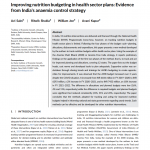
Secrecy over the draft Whistleblower’s Bill
16 August 2010
Efforts to bring in legislation to protect whistleblowers in India have been on-going for some years now. In 2001, the Law Commission of India studied the laws that protect whistleblowers in the UK, USA and other developed countries and had submitted a report to the Government. Along with the report the Law Commission submitted a weak draft bill to protect whistleblowers. Meanwhile in the absense of a specific law on the subject, the Government of India created a mechanism for its employees and those employed in central public sector enterprises to blow the whistle on wrongdoings.
The Public Interest Disclosure and Protection of Informers Resolution was notified by the Government of India in 2004 to enable public sector employees to make disclosures of wrongdoing to the Central Vigilance Commission in confidence. This mechanism only covers employees working in the Government of India or any of its agencies. It does not cover the employees of State Governments. However, a law to protect all whistleblowers may be a reality in India very soon following the Cabinet’s approval of the Public Interest Disclosure and Protection to Persons Making the Disclosure Bill, 2010 on 9th August. The draft Bill aimed at protecting whistleblowers is a welcomed move. However the lack of public debate and consultation on the Bill is not.
Secrecy over the draft whistleblower Bill and lack of public consultation:
In recent months the media has published reports about major disagreement within Government over the contents of this Bill. However the Government of India has not made any attempt to place the draft Bill in the public domain and consult with the people. Instead people will have to wait for the Bill to reach Parliament before they can comment on it. This secrecy is in clear violation of Section 4(1)(c) of the Right to Information Act, 2005. According to Section 4(1)(c) of the RTI Act
“4. (1) Every public authority shall—
X X X
X X X
c) publish all relevant facts while formulating important policies or announcing the decisions which affect public;”
The draft whistleblower Bill is an important legislative policy whose contents the Government ought to have disclosed while formulating it. However the age-old practices of undue secrecy observed by the bureaucracy, while drafting legislation, continues to hamper the effective implementation of the RTI Act. Even here there is no consistency of practice. While other Ministries go through elaborate processes of public consultation on draft legislations such as the Draft Direct Taxes Code Bill and amendments to the Companies Act, the whistleblower Bill does not get the same treatment.
Given the tremendous importance of this legislation it is essential that the public have the opportunity to scrutinise and comment on its provisions – else there is a very real danger of it becoming another “paper tiger”.
Venkatesh Nayak is the RTI Programme Coordinator, Commonwealth Human Rights Initiative (www.humanrightsinitiative.org)





